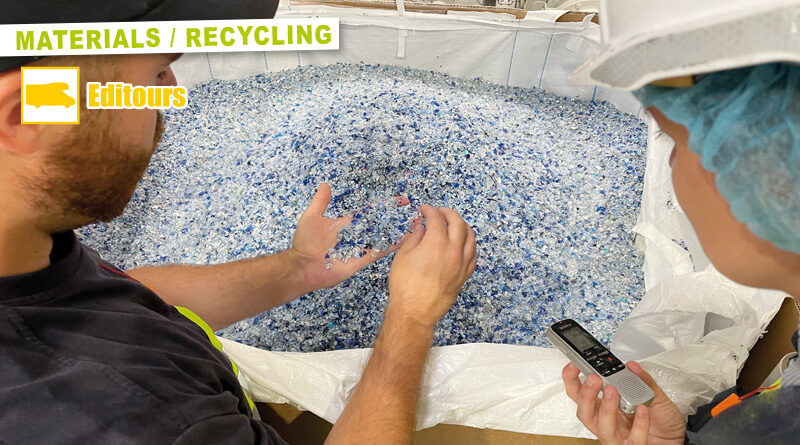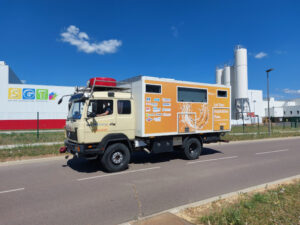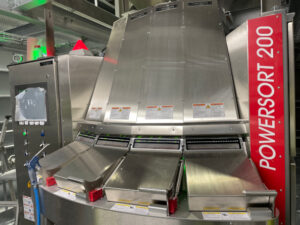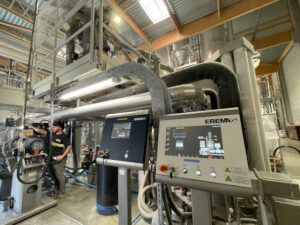rPET and preform production under one roof
Investment in state-of-the-art equipment pays off
From Spain, we passed the Pyrenees and were warmly welcomed in France in Chalon-sur-Saône, 135 km north of Lyon, at the SGT & SGR factory site. Our last visit was already six years ago, and a lot has happened since then. The SGR/SGT team looked somewhat surprised and incredulous when we parked the Editour-mobile in the car park and assured them that we were indeed living in it during our road trip.
We met: Jean Marc Wiencek, Factory Manager SGT & SGR,
Anthony Dio, SGR Team Leader
Fabien Tabart, SGT Production Workshop Manager
The SGT and SGR factory is located in Chalon-sur-Saône on 5 ha of land in the Saône Or business park. “The location of the site was chosen because of its strategic position since it benefits from a good connection with the road and motorway networks. The 10,000 m2 factory for the SGR part has been operational since 2019. In June 2022, the SGT/ SGR has been expanded,“ explained Jean-Marc Wiencek. We asked for some updates since our last meeting in 2016. “In 2016, we put a lot of effort in SGT Algeria Spa. We equipped it with new cap injection presses. In 2017, SGT Algeria was FSSC 22000 certified for its two manufacturing plants in Rouïba and Setif. One year later SGT Algeria inaugurates its third plant dedicated to HDPE caps localised in Setif. In 2018/19, we started the extension of the Rezé site, close to Nantes and commencement of works on the new preforms manufacturing plant and a recycling production unit SGR in Chalon-Sur-Saône, in Saône-et-Loire,” Fabien Tabart, SGT production workshop manager told us.
While starting a tour through the new SGR plant, Anthony Dio, SGR Team Leader reported about the PET recycling plant: “For four years, SGT has obtained the European label “MORE” Mobilised to REcycle. Created by the Federation of Plastics and Composites Polyvia, this label awarded manufacturers who incorporate recycled plastic materials in their production. It is saluted our commitment to a circular economy. In addition, in 2022 SGR obtains a favourable opinion from Efsa for its PET bottles recycling process.” He continued: “With SGR we assist our customers with their voluntary commitments to move towards a circular and responsible economy. With the plant we supply superior quality rPET suitable for food contact. From old plastic bottles we manufacture new preforms and therefore new bottles. Thus, SGR offers a second life to used bottles, so they are no longer perceived as waste but as reusable resources. 100% of SGR’s rPET ends up in our preform production. SGR is not selling its rPET externally, only including in customers preform production. We collect or buy crystal and blue-coloured flakes. SGR produces the highest quality of rPET suitable for food contact. By the end of the year 2022 we approximately will have an output of 12,000 t of rPET.”
As we walked past the preform machines into the recycling hall, we can see the material flow of the rPET in pipes that are guided along the ceiling. Finally, we arrive at the reycling hall and are greeted by the finest recycling equipment: Bühler-Sortex, Unisensor, Erema Basic extruder (Efsa-Q2019-00488) and Polymetrix SSP (Efsa-Q2020-00129). “When SGR takes delivery of PET flakes, it performs four additional grading processes: optical, metal, colour and material. Everything is meticulously inspected. Our recycling line is at the cutting edge of the latest technologies currently available on the market, enabling us to produce rPET of the highest quality. The site uses a vacuum-assisted Solid State Polycondensation (SSP) technology that guarantees industrial security at all stages of the thermal process and eliminates all remaining impurities on a molecular scale. SGR also has an extruding machine with underwater cutting and an ultra-efficient decontamination system that produces rPET pellets whose visible qualities (transparency and colour), mechanical qualities (viscosity) and organoleptic qualities match those of virgin PET. The whole process requires little consumption of energy. During extrusion, the decontamination reactor makes the PET suitable for food contact. It allows the flakes to melt, to filter them (at 36 µm) before leaving them in the form of granules. Our extruder is equipped with an underwater cutting allowing direct crystallisation of the granule. The flow rate of our equipment is 1,500 kg/h. The decontamination process takes part on a molecular scale. At this stage, the viscosity index (IV) of the granules obtained is similar to virgin PET. Nitrogen vacuum depression is at 200 mbar, the temperature is 200 °C. The residence time of PET granules is about 10 hours. SGR has invested 8 million euros in its decontamination line,” Anthony proudly announced.
While walking back we passed the preform production area again. Fabien Tabart, SGT Production Workshop Manager explained us some hard facts on SGT and SGR: “With a workforce of 170 employees in Rezé and 50 employees in Chalon-Sur-Saône and finally SGT Algeria with 330 employees, we have an overall turnover of € 152.7 million for SGT France, € 136 million for SGT Algeria and € 12 million for SGR. With growth of 5% in each plant, we export about 25% of our production. SGT offers a broad range of more than 270 customisable preforms (from 100 ml to 20 l) and seven types of caps and handle in high-density polyethylene (HDPE). The SGT group’s annual production capacity totals 7 billion preforms and 2.8 billion caps. The best-selling preform is the one for the 1.5 l water bottle. 80% of our preform production is sold to the food and beverage (50% water, 25% CSD, dairy drinks 8%, juices 5%) and 20% to the non-food market. We expect the African continent, with its growing population, to achieve significant growth rates in the coming years.”
After the factory tour and some interesting conversation, we ask Jean Marc Wiencek for a final statement on the current situation: “Between logistical difficulties, geopolitical instability (Ukraine), the health crisis, plastic bashing and now the energy crisis, we have to face every adversity. The yesterday’s certainties are now replaced by caution. Despite everything, if we had to stay positive, I would say that we are learning to live in an uncertain and increasingly risky environment. That is what we call resilience.” We thank our hosts and climb into the cab of our Editour truck – our journey continues, because communication and information exchange are an important means to overcome any crisis!





